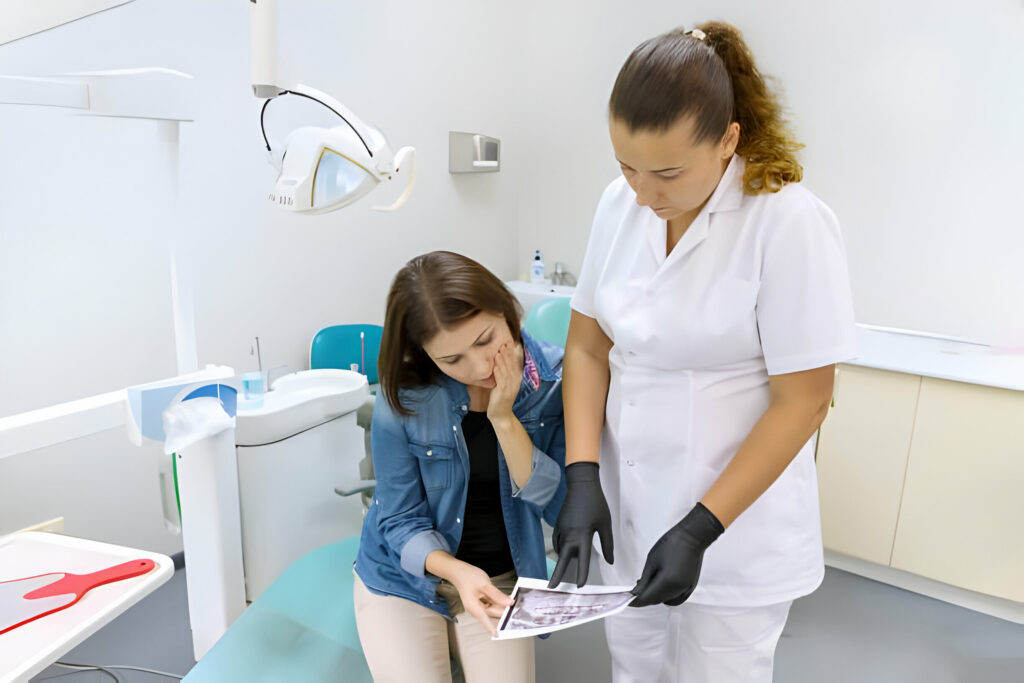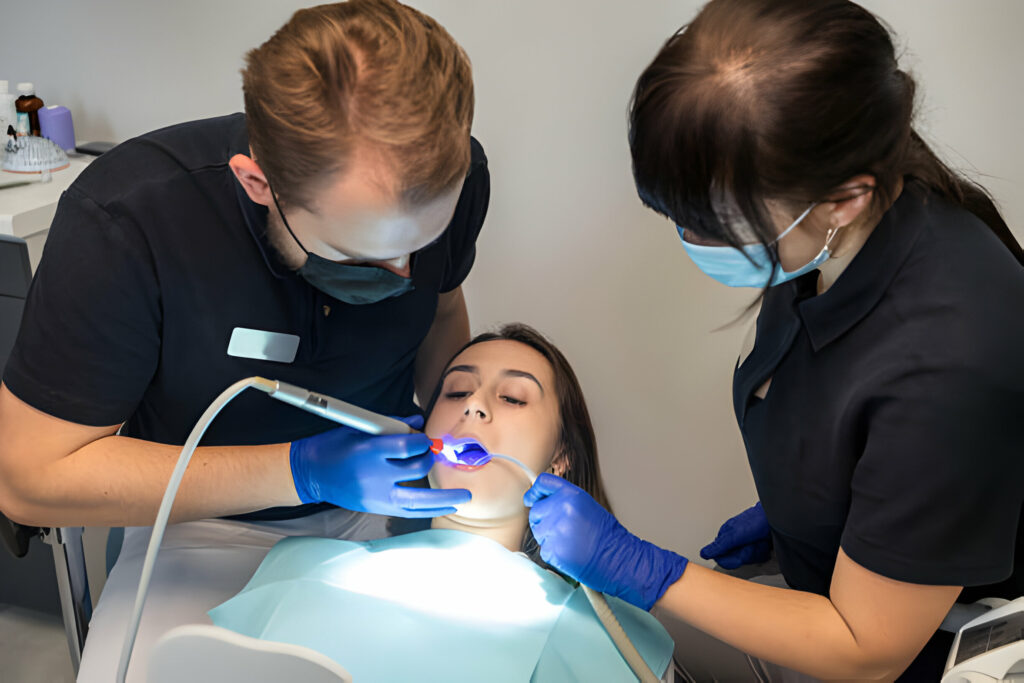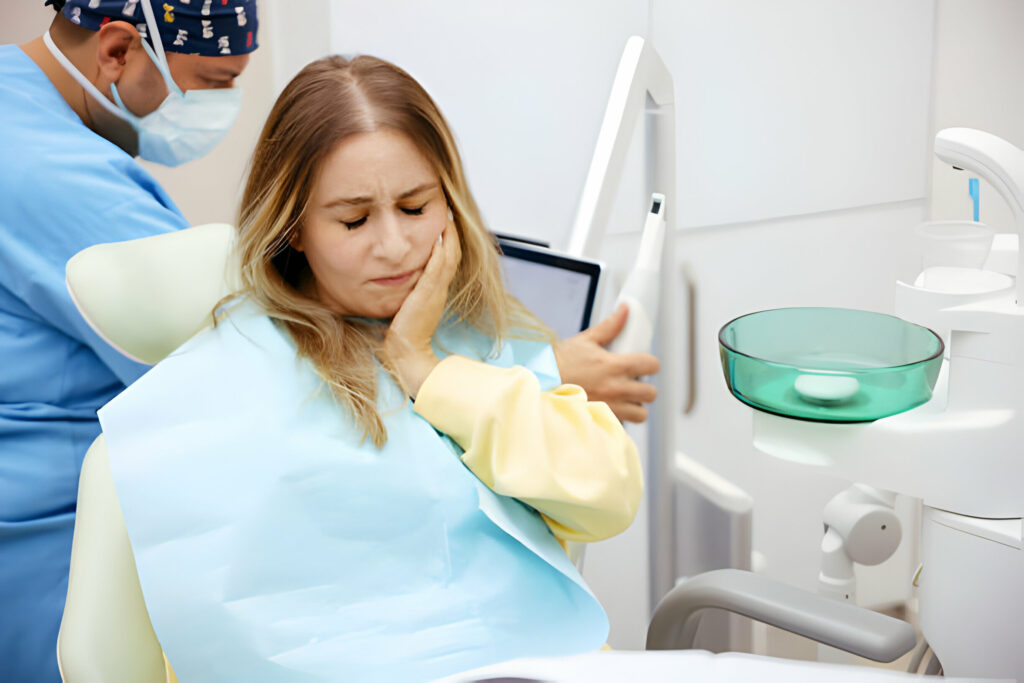Summary:
A knock on the face is perhaps one of the worst things you can experience.
It’s scary and painful.
Unfortunately, if something like this occurs to you, the first thing to remember is to stay calm because knocked-out teeth are common. Over five million people experience knocked-out teeth every year.

The first hour after a knocked-out tooth is considered a ‘golden hour.’ If you follow the proper measures, you can save your teeth during this time.
But what are those measures? Like you, most people have no idea what to do when their teeth are knocked out.
Keeping that in mind, we shall walk you through topics like:
- Knock-Out Tooth – What Is It About?
- Is Knocked-Out Tooth A Dental Emergency?
- What to Do If A Knocked-Out Tooth Goes Beyond The First Hour?
- How Can Emergency Dentists Help After A Knocked-Out Tooth?
- Risks Of Ignoring A Knocked-Out Tooth
Continue reading as we learn what to do during the golden hour with a knocked-out tooth.
Knocked-Out Tooth – What Is It About?
Before we delve into the preventive measures, let’s understand what a knocked-out tooth is.
An avulsed or knocked-out tooth occurs when your tooth becomes entirely removed from its socket. In normal words, it’s a tooth knocked out of your jaw.
While several causes could lead to this, here’s an overview of the most common instances of knocked-out teeth:
- Dental trauma
- Sport injuries
- Accidents
- Physical fight
- Bitting on a hard object
Is Knocked-Out Tooth A Dental Emergency?
Yes, a knocked-out tooth is a dental emergency. Seeking the immediate attention of your dentist can help prevent further complications. It increases the chances of your tooth re-implantation into the socket.
Immediate Responses To A Knocked-Out Tooth During The First Hour
Facing the sudden loss of a tooth due to an accident or injury can be alarming. Prompt and appropriate responses can help you save the tooth and safeguard your dental health.
Here’s an in-depth guide on what to do during the critical first hour after a tooth gets knocked out:
Locate Your Tooth First
The first thing you must do is to locate your teeth right after the incident. Time is of the essence, so try to find your tooth as soon as possible. Search where the incident occurred, and pay attention to any visible debris or blood. You can also involve your family and friends in the hunt.
Assess The Damage, Be Gentle
Once you’ve found your tooth, assess the extent of the damage. Look for any visible fractures, chips, or debris attached to the tooth. It’s essential to handle the tooth with extreme care to preserve its viability for reattachment. Avoid touching the root surface, as this can compromise the chances of successful re-implantation.
Carefully Clean Your Tooth
Clean the tooth gently without causing further damage if it is dirty or contaminated. Rinse the tooth briefly with milk or saline solution to remove visible debris. Avoid using water, soap, or disinfectants, which can harm the root surface. The goal is to maintain the tooth’s natural structure while removing external contaminants.
Attempt For A Replantation
Once done, try re-implanting your tooth into the pocket as soon as possible. Carefully guide your tooth back into place, ensuring proper alignment with the surrounding teeth. Apply gentle pressure to hold the tooth in position.
Replantation increases the likelihood of successful reattachment and preservation of the tooth’s functionality. However, if your tooth is still attached to the jawbone, hold it gently. Keep biting on a tissue or gauze pad to keep your tooth attached.

What to Do If A Knocked-Out Tooth Goes Beyond The First Hour?
Once you have located your tooth and re-implanted it back in the socket, handle the situation calmly. Maintain a calm demeanor and try to control your bleeding.
Then, seek the help of emergency dentists from Kelly Dental, who can address issues like tooth loss or knocked-out teeth.
How Can Emergency Dentists Help After A Knocked-Out Tooth?
When a tooth is knocked out due to injury or trauma, seeking immediate dental attention can save your teeth. Here’s how an emergency dentist can save it:
Thorough Examination
When faced with a knocked-out tooth emergency, dentists comprehensively examine the affected area. They might use X-ray imaging to evaluate your tooth’s condition, which will help them assess the extent of damage to the tooth and surrounding tissues.
Splinting for Stability
Your dentist may splint the knocked-out tooth to adjacent teeth to improve your chances of successful re-implantation. This splinting procedure provides stability and immobilizes the tooth, reducing the risk of displacement during the healing process. Proper splinting is crucial for optimal alignment and preventing further trauma to the affected area.
Root Canal Treatment (if there’s a pulp issue)
Root canal therapy may be necessary if your knocked-out tooth has been out of the socket for a long time or exhibits signs of pulp damage. Dentists remove your damaged pulp tissue, disinfect the tooth’s interior, and administer tooth fillings to prevent infection. Root canal treatment is essential for preserving the tooth’s structure and ensuring long-term viability.
Surgical Re-Implantation
Surgical re-implantation is the primary objective for a knocked-out tooth. Your dentist will carefully reposition your tooth into its socket, ensuring proper alignment and stability. Swift re-implantation is crucial to maximize the chances of successful tooth retention.
Risks Of Ignoring A Knocked-Out Tooth
A knocked-out tooth requires immediate attention to prevent potential complications. Failing to address this dental emergency in Huntingburg can lead to risks and long-term consequences.
Permanent Tooth Loss
Neglecting a knocked-out tooth increases the likelihood of permanent tooth loss. Without swift re-implantation or professional dental care, the chances of saving the tooth decrease significantly.

Dental Misalignment
The absence of a tooth can cause neighboring teeth to shift, resulting in dental misalignment. This misalignment not only affects the appearance of your smile but also compromises bite function and oral health.
Bone Resorption
Leaving a knocked-out tooth unattended can lead to bone resorption in the empty socket. Over time, the jawbone in the area may deteriorate, weakening the overall structure and potentially causing additional tooth loss.
Takeaway
- Every year, around 5 million people experience a tooth knock-out.
- The immediate aftermath of a knocked-out tooth is critical, known as the ‘golden hour.’ Acting promptly during this period significantly improves the chances of saving the tooth.
- Following a tooth being knocked out, it’s crucial to swiftly locate the tooth, assess any damage with care, clean it gently to avoid further harm, and, if feasible, attempt re-implantation.
- After the initial response, seeking urgent dental care is essential. Emergency dentists can conduct thorough examinations, provide stability through splinting, perform root canal treatment if needed, and perform surgical re-implantation.
- Neglecting a knocked-out tooth can result in permanent tooth loss, dental misalignment, and bone resorption in the socket, underlining the importance of swift intervention.
- Did you experience a similar situation? Don’t wait for matters to worsen; connect with our experts at Kelly Family Dentistry today!


